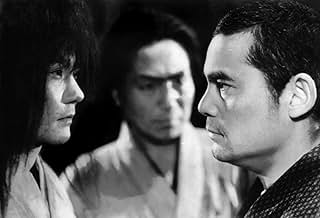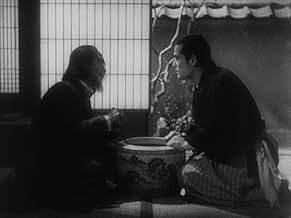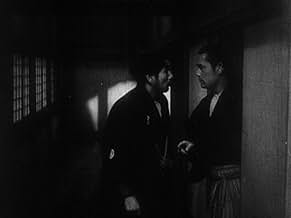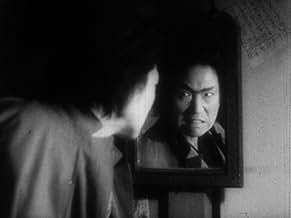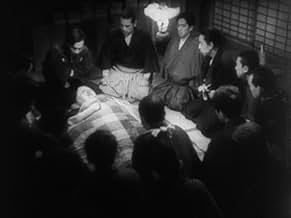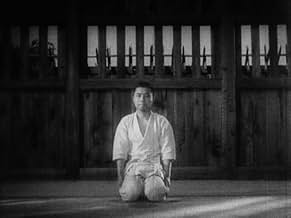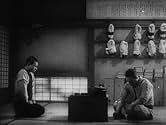IMDb रेटिंग
6.0/10
3 हज़ार
आपकी रेटिंग
अपनी भाषा में प्लॉट जोड़ेंSugata returns to prove his judo mastery in a match against Western opponents.Sugata returns to prove his judo mastery in a match against Western opponents.Sugata returns to prove his judo mastery in a match against Western opponents.
- निर्देशक
- लेखक
- स्टार
Kô Ishida
- Daisuburo Hidarimonji
- (as Ko Ishida)
Osman Yusuf
- American Sailor
- (as Osman Yusef)
फ़ीचर्ड समीक्षाएं
Akira Kurosawa's third film, released a year after The Most Beautiful (which he made for his wife) (actually, if it weren't for the lousy search function of Douban, there'd be no need to repeat this sort of objective reality in a review).
Akira Kurosawa himself, in his autobiography "Toad's Oil", doesn't seem to recognize much of the cinematic value of this "sequel to Zizan Sanshiro", which coincides with the popular aesthetic, the biggest criticism being the lyrical patriotism, similar to that in the modern-day Ip Man, an element that was loathed in the movies 60 years ago, and is still the case 60 years later. It's just obvious that the director, who has influenced Western cinema many times over in terms of casting and dramatization, naturally has his own insights. In the "Zi San Shiro sequel" will rarely see so involved, Kurosawa has shot, so low mobilization of nerves of film and television subject matter, at this point, I think the domestic film and television industry is still worth looking back at history to learn.
But the master is a master, after all, in the "Zi San Shiro sequel" we did not see colorful on that bad bridge too much continuation, but is point to the end, in the end oriented to the benevolence of the evil of revenge on the ending. It's as if when countless critics were giddy as if they were watching this talented Japanese director have some cracks in him, Akira Kurosawa once again backtracked on the theme of human kindness so that his early style wouldn't be so clearly labeled as patriotic.
Even now, as a director who has just made two movies, in his early work has revealed extremely artistic light and composition, in dealing with multiple people standing, not only makes people wonder if Antonioni has come here to steal the division.
Akira Kurosawa himself, in his autobiography "Toad's Oil", doesn't seem to recognize much of the cinematic value of this "sequel to Zizan Sanshiro", which coincides with the popular aesthetic, the biggest criticism being the lyrical patriotism, similar to that in the modern-day Ip Man, an element that was loathed in the movies 60 years ago, and is still the case 60 years later. It's just obvious that the director, who has influenced Western cinema many times over in terms of casting and dramatization, naturally has his own insights. In the "Zi San Shiro sequel" will rarely see so involved, Kurosawa has shot, so low mobilization of nerves of film and television subject matter, at this point, I think the domestic film and television industry is still worth looking back at history to learn.
But the master is a master, after all, in the "Zi San Shiro sequel" we did not see colorful on that bad bridge too much continuation, but is point to the end, in the end oriented to the benevolence of the evil of revenge on the ending. It's as if when countless critics were giddy as if they were watching this talented Japanese director have some cracks in him, Akira Kurosawa once again backtracked on the theme of human kindness so that his early style wouldn't be so clearly labeled as patriotic.
Even now, as a director who has just made two movies, in his early work has revealed extremely artistic light and composition, in dealing with multiple people standing, not only makes people wonder if Antonioni has come here to steal the division.
Though not impressed with the original Sanshiro Sugata I did consider it a noteworthy film in Japanese movie history and certainly had its charm.
The sequel see's our judo fighter hero presented with further foes he must vanquish and more moral dilemmas. Ontop of this he finds himself pressured into participating in an east vs west/boxing vs judo bout.
This sequel was heavily criticized and considered a propaganda film (Of which there were many around this time coming out of Japan). Truth be told I don't understand why or how this could be considered such, there was no military/political motivation to be found.
Inferior to the original? Yes, but not by much. The Sanshiro Sugata movies have their merits but don't deserve (In my opinion) the critical acclaim they recieved. I'm curious what happened with the sequels and quite look forward to finding out.
The Good:
Follows on from the original well
The Bad:
Looks dated even for its time
Things I Learnt From This Movie:
Susumu Fujita was reincarnated as Mark Dacascos
Fighting barefoot in the snow for real, there should be an oscar category for such feats!
The sequel see's our judo fighter hero presented with further foes he must vanquish and more moral dilemmas. Ontop of this he finds himself pressured into participating in an east vs west/boxing vs judo bout.
This sequel was heavily criticized and considered a propaganda film (Of which there were many around this time coming out of Japan). Truth be told I don't understand why or how this could be considered such, there was no military/political motivation to be found.
Inferior to the original? Yes, but not by much. The Sanshiro Sugata movies have their merits but don't deserve (In my opinion) the critical acclaim they recieved. I'm curious what happened with the sequels and quite look forward to finding out.
The Good:
Follows on from the original well
The Bad:
Looks dated even for its time
Things I Learnt From This Movie:
Susumu Fujita was reincarnated as Mark Dacascos
Fighting barefoot in the snow for real, there should be an oscar category for such feats!
I have seen every Akira Kurosawa movie available on VHS or DVD and this is the first "bad" one among them. In fact, I will be so bold as to say I doubt he really directed it. His name is on the credits but I don't see a shred of him in the work. No environmentally framed shots, no contrasts of light and dark, no horizon dividing the frames. He must have done this one with a week of shooting time or a budget of 50 Yen. The comical fight between the Judo stylist and Karate stylist literally made me laugh out loud. It looked like parody. Nothing like the climatic fight in the first Sugata Sanshiro. Also the subtitles were apparently done by someone in China who could speak a little Japanese and a little English. They use the word "karate" for both karate and judo, and since the main conflict is between the two styles, you'd better pay attention to who's doing the the talking or you'll never follow the plot. The movie just about "braked" me.
Sugata and Yano have established the dominance of Judo over jujitsu by defeating all comers, but Sugata is not satisfied. Yes, he is the best Judo practitioner in the land, but he is plagued by his victories and is not sleeping.
Judo is also facing competition from boxing and karate. Yes, boxing has come to Japan with the occupation. The anti-American sentiment is strong in this film as the top boxer is a drunken sailor who pick on poor rickshaw drivers until Sugata manages to cool him off - laterally. They will meet again.
Sugata finally comes to terms with who he is and dispatches the boxer in the first round. Now, the karate thugs have been injuring many to get Sugata to fight.
The actual fight is a letdown. It is staged to look almost like those shadow puppets. The calm and cool Sugata is facing a grimacing overly loud competitor.
It should not be a surprise who wins, but there are more demons on the horizon. Five years after this film, I will have arrived. What will happen then? The only distraction was the poor quality of the film. One would hope that a better copy would have survived. Of course, we have to wait until the arrival of Toshiro Mifune before Akira Kurosawa perfects his Samurai films and becomes the great master that he was.
Judo is also facing competition from boxing and karate. Yes, boxing has come to Japan with the occupation. The anti-American sentiment is strong in this film as the top boxer is a drunken sailor who pick on poor rickshaw drivers until Sugata manages to cool him off - laterally. They will meet again.
Sugata finally comes to terms with who he is and dispatches the boxer in the first round. Now, the karate thugs have been injuring many to get Sugata to fight.
The actual fight is a letdown. It is staged to look almost like those shadow puppets. The calm and cool Sugata is facing a grimacing overly loud competitor.
It should not be a surprise who wins, but there are more demons on the horizon. Five years after this film, I will have arrived. What will happen then? The only distraction was the poor quality of the film. One would hope that a better copy would have survived. Of course, we have to wait until the arrival of Toshiro Mifune before Akira Kurosawa perfects his Samurai films and becomes the great master that he was.
Sanshiro Sugata 2 (1945)
** 1/2 (out of 4)
Kurosawa's sequel has Sugata (Susumu Fujita) still growing in the world of judo but outsiders are wanting to make the fighting style a sport and put it up against American boxing. This is a rather strange film but I do think it's better than the original just because of how out there it is. I've read that the government forced Kurosawa into making this and you can tell because that plays a part in the film. American boxing is really looked down upon and fighting as a sport is shown to be evil and this really translates to Kurosawa being unhappy as he was forced to make this just like the characters here are being forced to do something they see as morally wrong. Seeing the different fighting styles mixed up together was pretty fun as was the ending, which takes place during a snow storm. Fujita is a lot better here than he was in the previous film and really delivers a strong performance and makes his character quite memorable with the difficulties that he faces. The film's biggest problem comes in form of some rather choppy storytelling that has the film wonder off from its main goal way too many times and this is certainly true in the final fifteen-minutes before the final showdown. The low-budget nature of the film also shines through in a negative way but I'm sure the fans of the director will want to watch this at least once.
** 1/2 (out of 4)
Kurosawa's sequel has Sugata (Susumu Fujita) still growing in the world of judo but outsiders are wanting to make the fighting style a sport and put it up against American boxing. This is a rather strange film but I do think it's better than the original just because of how out there it is. I've read that the government forced Kurosawa into making this and you can tell because that plays a part in the film. American boxing is really looked down upon and fighting as a sport is shown to be evil and this really translates to Kurosawa being unhappy as he was forced to make this just like the characters here are being forced to do something they see as morally wrong. Seeing the different fighting styles mixed up together was pretty fun as was the ending, which takes place during a snow storm. Fujita is a lot better here than he was in the previous film and really delivers a strong performance and makes his character quite memorable with the difficulties that he faces. The film's biggest problem comes in form of some rather choppy storytelling that has the film wonder off from its main goal way too many times and this is certainly true in the final fifteen-minutes before the final showdown. The low-budget nature of the film also shines through in a negative way but I'm sure the fans of the director will want to watch this at least once.
क्या आपको पता है
- ट्रिवियाThe final fight scene was filmed outdoors in real snow. Susumu Fujita, fighting barefoot, had to be carried to a bonfire between each shot as his feet would go numb.
- कनेक्शनFollows Sugata Sanshirô (1943)
टॉप पसंद
रेटिंग देने के लिए साइन-इन करें और वैयक्तिकृत सुझावों के लिए वॉचलिस्ट करें
- How long is Sanshiro Sugata, Part Two?Alexa द्वारा संचालित
विवरण
- रिलीज़ की तारीख़
- कंट्री ऑफ़ ओरिजिन
- भाषा
- इस रूप में भी जाना जाता है
- Sanshiro Sugata, Part Two
- फ़िल्माने की जगहें
- Toho Studios, टोक्यो, जापान(Studio)
- उत्पादन कंपनी
- IMDbPro पर और कंपनी क्रेडिट देखें
- चलने की अवधि
- 1 घं 23 मि(83 min)
- रंग
- ध्वनि मिश्रण
- पक्ष अनुपात
- 1.37 : 1
इस पेज में योगदान दें
किसी बदलाव का सुझाव दें या अनुपलब्ध कॉन्टेंट जोड़ें

